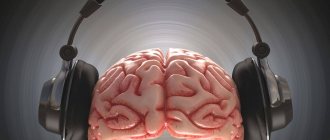In my previous post, I wrote about what you shouldn’t do if you have performance problems. In this part I will talk about an effective method that does not require medications. Medicines are only support, an addition. But this method requires organization and willpower, and therefore is so disliked by most of us. First, I’ll tell you a little about some basic principles of how the nervous system works. I do not pretend to be complete here; rather, I deliberately shortened the presentation so that it would be understandable to the majority. The work of the nervous system is the processes of excitation, inhibition, conduction, and integration. Neurons receive and process signals, conduct them along their processes and interact with each other.
The transmission of a signal along the processes of neurons is electrical activity. A change in membrane polarization propagates along the processes; this process requires energy expended on the operation of ion pumps.
Another important process is synaptic transmission. One cell releases intermediary molecules into the synaptic cleft, mediators that act on the receptors of another cell, stimulating or inhibiting its activity.
Neuronal activity requires energy. Lots of energy. Where does it come from? One of the most important biological processes is respiration. At the cellular level, respiration means the oxidation of nutrients and the production of energy. I'll tell you in a very simplified way. Oxygen and nutrients enter the tissues with arterial blood. Then they enter the cell. There are whole chains of enzymes and coenzymes, the work of which ensures the oxidation of nutrients with oxygen. Carbon dioxide, water and other products are formed. They must be removed from the cell and from the tissue into the blood.
In addition to breathing, there are many more biochemical processes. For example, the synthesis of cell components (the same membrane, enzymes, ion pumps, etc.), as well as mediators. All these processes also require energy, nutrients, enzymes and coenzymes. No transmitters - no synaptic transmission.
The functioning of the nervous system should not be considered only at the cellular level. There are supracellular structures: groups of neurons, nuclei and centers of the brain, as well as such a mysterious thing in many respects as the reticular formation, as well as the pineal gland, the limbic system. They influence the cerebral cortex.
There are structures in the brain that are characterized by cyclical activity. They stimulate or suppress the activity of other structures. One of the important cycles is the daily cycle. Cyclic changes in neuronal activity are extremely important for recovery processes. The reserves of nutrients, high-energy compounds, mediators, and components of the cell itself must be restored. New connections between neurons must be formed. Structural changes must occur in the neurons themselves.
By the way, when using stimulants, you simply “burn through your emergency reserve.” Just as stupid party nomenclatures, in order to increase meat production in their reports, sent dairy herds to the slaughterhouse, so you, by taking caffeine, “energy drinks” and similar substances, are slowly killing your neurons.
A natural and stable daily routine is the most effective remedy
A natural, stable daily routine is the most effective remedy.
Moreover, it is non-medicinal. And this remedy is the most underrated and most disliked by most of us. You can eat pills, but without a daily regimen, you can throw them in the toilet with almost the same effect. The daily routine is not just “sleep eight hours.” For some, six is enough, for others - nine. The most important thing is to develop and maintain a stable daily rhythm. And not just any kind, but natural. It is natural for Homo sapiens to wake up in the morning, stay awake during the day, rest in the evening and sleep at night.
Anticipating the invasion of crazy red-eyed coders who are pathologically proud of being night owls, I will say that after the night owls return to their natural cycle, their productivity increases and their mood improves. In fact, the division into “night owls” and “larks” is quite arbitrary. Among those who work better at night than during the day, there are almost no real night owls. There are simply people with a stable unnatural daily cycle.
Each person has a slightly different body temperature, heart rate, and breathing rate. But these parameters, nevertheless, have a norm. Just as the normal temperature in the armpit is 36.6 degrees Celsius, so the normal rhythm is the one I described, let’s call it “morning”.
I myself have experienced periods when I work better at night than during the day. But let's look at this situation as follows. Let’s take a person’s maximum performance as 100%. Now let’s make it an “owl”. During the day he will nod off and work at thirty percent, and by night he will become more active, say, up to seventy percent. But still, he will not reach that maximum and that comfortable state that would be with the natural biological rhythm of Homo Sapiens.
For millions of years, all life on Earth has been subject to a daily rhythm. And almost all living things receive this rhythm thanks to cyclic changes in lighting. One of the substances produced cyclically in the brain is melatonin. Approximately 70% of its secretion occurs at night. The pineal gland increases melatonin production when it is dark.
It is very important to go to bed and wake up at approximately the same time. I recommend going to bed around 11:30 pm and waking up around 7:30 am. You can go to bed at a different time, a little earlier or a little later. It is important to wake up consistently.
And again I foresee objections about “deadlines”, “blockages at work”. Let me remind you of the story about two lumberjacks who staged a competition. One chopped without stopping, and the other’s ax periodically fell silent. And when the second woodcutter stopped chopping, the first one heard it and began chopping even faster. Imagine his surprise when it turned out that the second woodcutter had cut twice as much. “How can this be, since you stopped every hour and did nothing?” - asked the first one. “How is this nothing? “I was resting and sharpening my ax,” the second one answered him.
You will cope much better with deadlines and emergency situations if your ax is sharp. Remember what I talked about synthesis processes, the restoration of neurotransmitters and energy compounds? So, during healthy sleep they are restored. And many more little-studied processes occur. Some authors believe that it is during sleep that new connections between neurons are formed, and information is recorded in long-term memory.
We wake up easily
By the way, about proper awakening.
If you wake up shortly before your alarm goes off, don't oversleep. We need to get up. And if the alarm clock rings, but you don’t want to wake up, you still have to get up. Get up in the literal sense of the word. You have no idea how important it is to take a vertical body position. In most cases, the drowsiness goes away immediately. You will be surprised that a minute ago you thought it was impossible to crawl out from under a warm blanket. Stable morning “rituals” contribute to awakening. A contrast shower “washes away” drowsiness. The key word here is stability. The body will get used to the fact that you not only need to wake up, but also do something invigorating.
A little higher I talked about circadian rhythms, melatonin and the role of lighting. So, it will be very cool if you wake up in the light. There are alarm clocks that first turn on the light, and then, if you don’t wake up, they ring. I’ll talk about the role of lighting during the working day a little later.
Fall asleep easily and sleep well
If you do not have a pathology, then a stable daily rhythm with morning awakening will, after a while, make it easy to fall asleep.
It is very important that the room is not too bright, hot or stuffy. And also - so that your nose is not stuffy. It happens that a person complaining of morning “grossiness” undergoes sleep monitoring. It turns out that the poor guy wakes up 10 times a night, but he simply doesn’t remember it. It turns out he has problems with nasal breathing.
Don't use sleeping pills. Their principle of action is based on depression of the nervous system. This is not what we need, and the side effects can be very bad.
To rebuild the body to a normal rhythm, the drug Melaxen helps. These are melatonin tablets, a substance produced by the pineal gland when it’s time for us to sleep. You can use it for about 5-7 days, no more, one tablet 15 minutes before bedtime (most of this drug will be eliminated in 45 minutes) Be sure to take at least half a glass of water (like any tablet, so as not to stick to esophagus, this happens). This is not a sleeping pill in the usual sense of the word. This drug helps the brain adjust to a normal rhythm.
Glycine can also be used before bed. It must be used correctly: do not swallow, but place it under the tongue or behind the cheek.
I also heard about such alarm clocks, sleep trackers, which wake a person up at the appropriate phase of sleep. I haven’t tried it myself, I haven’t used it on patients, but it’s an interesting thing.
To fall asleep easily, it would be a good idea to get moderate aerobic physical activity 3-5 hours before bedtime. And here we will touch on the next topic - physical inactivity.
How you can increase your performance, energy and vigor: 7 simple steps
The most common techniques today are those in which maximum results are achieved with the least effort. I will describe some of them.
Pareto's Law
It says that 20% of the costs bring 80% of the “fruits”, and in the second part of the activity these numbers are reversed. This rule applies to all areas of life. In this regard, all secondary tasks should be performed at a time of low productivity, and priority tasks should be performed, on the contrary, when vitality is at its peak.
Three Important Activities
Many people create a daily schedule, which helps make the work process more organized. Therefore, every morning, identify the 3 most important things for yourself. If you complete them earlier than expected, you can move on to the rest.
"Do less"
A popular technique that has several different approaches. For example, some experts recommend taking a few minutes off during the workday and devoting yourself to meditation. This way you can get rid of stress, restore your breathing and concentrate on your responsibilities. Don't overload yourself. After all, it is better to do not so much, but with high quality, than to complete the entire volume, but “carelessly.”
Pomodoro technique
This method of increasing the performance of the human brain was discovered by Francesco Cirillo. The name came from the fact that the kitchen timer he used to keep time was shaped like a tomato.
The bottom line is that you should devote 25 minutes to intense work, and then be sure to take a five-minute break. After four such segments, you need to rest longer.
Multitasking – myth or reality
This mode is unlikely to make you more productive. After all, when we pay attention to several things at the same time, it has a bad effect on overall productivity. Even though you are well-trained, your effectiveness will be significantly lower than if you take on one task and complete it from start to finish.
Information diet
At a time when the flow of information coming from all sides is enormous, it is as easy to become oversaturated with it as to get sunstroke in the desert. Symptoms of this include slow reaction times, poor sleep, and absent-mindedness. Therefore, it is worth limiting yourself from such noise and trying to obtain as little unnecessary data as possible. You will see that in just a week your productivity will increase significantly.
Life on schedule
According to Parkinson's rule, work requires as much time as was allocated for it. So, if you decide that you will complete a specific task in a week, it will continue for that long. But if you set stricter boundaries, then dealing with the task will be much more effective.
Ask a question
Fighting physical inactivity
I will not dwell in detail on the pathological mechanisms of physical inactivity.
Let me just say that we all suffer from it. You can’t even imagine the truly enormous lack of movement that city dwellers experience. Especially IT people. Two good ways are morning jogging or cycling. For myself, I chose a bicycle. By personal or public transport, given the current congestion of St. Petersburg streets, it will take me about 50-70 minutes to travel. The same is true on a bicycle.
I exchange an hour of standing in traffic jams or jostling in a sweaty subway for the same hour of moderate aerobic exercise. I don’t spend such expensive time additionally, as if after work I went to the fitness center and pedaled on the exercise machine. By the way, it turned out that you sweat more on the subway.
I recommend getting up and leaving early, before rush hour and traffic jams. Firstly, the air will still be fresh. Secondly, it's safer. Thirdly, you arrive at work, and there are not many people there, it’s easier to concentrate. And finally, you don’t always have an appetite immediately after sleep. After a bike ride, your appetite will be good, food will be digested better, and you will be more energetic.
Once you bike home, you'll have a few more hours to "settle down." I recommend taking a warm shower rather than a contrast shower in the evening.
Not everyone can afford to ride a bike. I will share my “life hack”. Get off the transport one or two stops before and walk through them. Or jog easily.
Rest at work
The topic partially overlaps with physical inactivity.
How do IT people usually “rest”? They go, get coffee, read blogs, play something, smoke (a ray of diarrhea for tobacco companies). Rest is a change of activity. Many people know this, but they don’t use it at all. Changing “Photoshop” to “Bashorg” is not a vacation, although it is better than “dulling” over a layout when your head can no longer cook.
The correct way to relax is to get up from the computer, open the window, leave the room and do at least some physical activity, without thinking about work and “deadlines.” For this we have table hockey, darts and badminton in warm weather. You can at least do some squats and push-ups. It’s also better to eat food not at the workplace, but at least go somewhere to a cafe.
During prolonged sitting, some groups of muscles and nerve cells receive a static load, while others are relaxed. Physical activity allows you to restore the tone of relaxed muscles and blood vessels, restore normal blood flow, and accelerate the removal of cellular waste products from the body.
For a good rest during the working day, it is important to change activities, physical activity, distraction from the problem and a change of environment (get out of the cubicle, finally!)
How you can overcome fatigue and improve performance: 7 effective ways
By following the rules suggested below, you will definitely be able to find time for relaxation and personal life.
Daily schedule
Planning helps you be more organized about everything. This makes it easier to concentrate on your daily responsibilities and improve your ability to work. You will be surprised how much you can get done if you strictly follow the list.
Finish difficult tasks first
This way you will direct your main forces to solving a more difficult obligation. You'll have to finish them anyway, so why not do it right away?
Adequately assess opportunities
Do not include in your daily list anything that you physically do not have time to complete. Do the work as experience and energy allow.
Praise yourself for a good result
Rewards are a factor that greatly improves performance, as has been proven in the experience of many people. After another work victory, treat yourself to a delicious meal or other surprise. It is much more pleasant to take up service this way.
Quitting social networks
Many people spend a huge amount of time on messengers, which has a bad effect on their productivity. Plus, such sites create information noise, which was mentioned above.
Remember to rest
Between exhausting work, the body needs a break. Therefore, allow yourself to relax as soon as you have completed your next mini-goal.
Love your activity
A great way to restore and improve performance. After all, the greatest quality is achieved when we are in love with our work.
Leisure outside of work
There are two large parts here: “after work” and “on vacation”.
I won’t talk about vacation for a long time. I can only say that the benefits of a vacation will come with a change of scenery. This is its main psychotherapeutic effect. You need to leave, forget about work, problems, turn on your phone and computer only when necessary. Let’s dwell in a little more detail on regular “after work” rest. I recommend several types of such recreation: outdoor games (football, badminton, tennis), jogging, cycling, rollerblading, and also a swimming pool. A swimming pool is generally very cool, at least once a week. But all kinds of gyms will not give the same effect as aerobic physical activity.
Another thing that few people know about. Cleaning on weekends is not just about “getting clean and tidy.” This is a psychotherapeutic agent. I won’t describe the mechanisms here, just trust the doctor. Clean your apartment, your workplace, or even clean your computer. Freshen up your space.
Cleaning on weekends is not just about “getting clean and tidy.” This is a psychotherapeutic agent. I won’t describe the mechanisms here, just trust the doctor. Clean your apartment, your workplace, or even clean your computer. Freshen up your space.
My colleagues involved in the treatment of neuroses use such concepts as “psychological microclimate” and “microenvironment”. Use the weekend to arrange a change in this environment. Ideally, of course, go somewhere outside the city, but it doesn’t always work out.
The advice of one of my colleagues is not without common sense: sometimes take a break from those with whom you work, even if they are very good and interesting people.
Try to diversify your life as much as possible. If you take one route to work, try others. If you buy everything in one store, try the one next door. Eat pasta all the time - try boiled socks (you've read this far, ho-ho) Don't limit yourself only to specialized literature. Get yourself a non-computer hobby, sometimes go to the movies, theaters, and museums. It sounds trivial, but in just three months you will really get a significant effect.
Reasons for decreased performance
There are several very important factors to increase productivity.
Personal
Each of us reaches a level when he wants to grow professionally. If the team has created all the conditions for a successful career, then a constructive conversation with the manager will help you climb the ladder of success and develop further. If this is not possible, then the employee is unlikely to be interested in performing his duties efficiently. At the same time, other personal reasons may arise: falling in love or, conversely, breaking up with a loved one, illness of a child or relative, unfavorable living conditions in the family.
Physical and physiological
Here the determining factor is the state of health:
- severe fatigue due to a high working rhythm or incorrectly selected load;
- exacerbation of chronic or emergence of new diseases;
- disruption of natural biorhythms of sleep and rest;
- injuries received at home and at work.
All this has a significant impact on labor efficiency. Sometimes an improperly organized workplace can cause employee dissatisfaction, however, he lacks the determination to ask for a comfortable table or chair, and the long-term discomfort he experiences because of this develops into irritability and fatigue.
Psychological
Mental health is just as important as physical health. An unfavorable emotional environment at work and at home, bad mood, stressful situations in society and increased demands from management can plunge the most cheerful person into depression. Naturally, under such circumstances, there can be no question of a high-quality work process.
Material
Decent wages are the best incentive in any business. If for some reason a specialist does not receive it, then he considers himself entitled to work carelessly.
Secondary factors
In addition to the above, experts include the following as secondary factors:
- bad habits;
- excessive consumption of coffee and synthetic stimulants;
- physical inactivity;
- disorganization of the workplace and its clutter;
- incorrect work schedule;
- the need to work seven days a week and overtime.
Medicines
Much has already been said about glycine, nootropics and vitamins.
I’ll also say a few words. Take multivitamins, especially drugs like Vitrum Superstress, only in the indicated dosage. Usually this is one tablet per day. Take in the morning, at breakfast. Do not exceed the dose! The duration of the course of vitamins is 30 days, then take a break for 1-2 months.
Nootropil. A relatively safe drug, it has an antihypoxic effect and improves cellular respiration processes. Don't overuse it. It will be better if a doctor prescribes it for you, who will indicate the dosage and observe you, but I won’t describe the “do it self” regimens here. The effect is not instantaneous, it does not occur immediately.
Glycine. It is also a relatively safe drug. Before going to bed, one tablet under the tongue helps many people fall asleep easier. I wrote about Melaxen a little higher.
Everything else: caffeine, dietary supplements, stimulants, sleeping pills, amphetamines, antidepressants - forget. Just forget about them if the doctor who is treating you has not prescribed them for you. If the doctor prescribed dietary supplements, then forget this doctor. If psychotropic drugs were not prescribed by a psychiatrist, the same thing applies. If you suspect that you are depressed, consult a psychiatrist. If you have problems sleeping, go to a sleep center or a psychiatrist, again.
Smoking
Whatever the mental homosexuals say (I have no other decent words for these citizens) who defend smoking, smokers, the tobacco industry, hypoxia and constriction of brain vessels under the influence of nicotine have never contributed to the good functioning of brain cells.
Hypoxia is the main cause of neuronal inhibition. Smoking contributes to the development of hypoxia on several levels at once. Firstly, under the influence of nicotine, the vessels bringing arterial blood narrow. The supply of oxygen to tissues with blood decreases. Secondly, the transport capacity of hemoglobin decreases. The blood itself carries less oxygen and is more difficult to give it to tissues. One of the reasons is the formation of carboxyhemoglobin, a reaction product of hemoglobin with carbon monoxide (carbon monoxide). Thirdly, in addition to nicotine, tobacco smoke contains a bunch of substances that penetrate cells and block the processes of cellular respiration. That is, even the reduced amount of oxygen that enters the tissue cannot be properly absorbed by the neurons themselves, since the enzymes and cytochromes of the respiratory chains are suppressed.
And these effects do not appear in long-term smokers, unlike, say, emphysema or erectile dysfunction.
Now citizens will come running here, claiming that “they can’t work without a cigarette,” that “a cigarette helps them mobilize.” Complete bullshit. The simplest analogy is that a drug addict going through withdrawal without a dose also feels very bad. Systematic tobacco use leads to the formation of a stable pathological condition, and without the next dose, performance actually decreases and dysphoria sets in. But here’s the thing: if you didn’t smoke, then your performance during the day would be much higher than what you now have for a short time after a “mobilizing cigarette.”
For office workers: smoke only one at a time and outside the office. And choose not a constant time! By strictly following this rule, you will significantly increase your chances of quitting smoking. Destroy the pathological tradition, social attachment and this ugly ritual. Drive away the person who suggests “discussing it in the smoking room” without mincing words and measures of influence. This is your enemy.
Poor nutrition
If you regularly eat homeless packages, instant noodles and purees, chips, then along with all this goodness you consume glutamic acid or its salts, glutamates.
Glutamate is a flavor enhancer. Glutamate is also an excitatory neurotransmitter in the central nervous system. It has a short-term nootropic effect, but systematic consumption of increased doses of glutamate leads to changes in biochemical processes in the nervous tissue. For a snack, you can read about the Chinese restaurant syndrome. But even if there were no glutamates, such nutrition is bad because it is inferior. For example, a lack of vitamins. Remember what I talked about tissue respiration, synthesis and coenzymes? So, many vitamins act as coenzymes. If there are not enough coenzymes, the cell cannot function normally.
The homeless package itself is not so harmful. To get the same harm as from one cigarette, you need to eat ten of these instant noodles. But chronic nutrition with inadequate and monotonous food leads to an increasing lack of vitamins. And many other substances.
Your diet must include fresh vegetables, fish and vegetable fats. Vegetables are not only vitamins, by the way. And not just vitamins, but also a variety of their derivatives and precursors (provitamins). And not just powder pills, but “packed” into a cell membrane.
Fish and vegetable fats are polyunsaturated fatty acids, as well as fat-soluble vitamins. For example, vitamins A and E are involved in a huge number of synthesis reactions and are also antioxidants (they block chain reactions of free radical oxidation of cell components, some of these reactions are triggered by hypoxia).
But you shouldn’t practice veganism, it’s unnatural. The natural diet of Homo Sapiens is mixed. Meat contains essential amino acids, as well as iron and other elements in a form in which absorption occurs incomparably more efficiently than from plant foods.
You shouldn’t listen to those idiots who promote microscopic breakfasts. Let the “Cosmo girls” go through the forest with their advice. You need to have breakfast like a human being. You work all day, your body must get energy from food. The stove must be heated with wood, and not with logs from your own home.
Find time for physical activity
Remember how many times you told yourself that starting next week you would go to the gym. The time has come when you can no longer “put off until tomorrow what needs to be done today.” It turns out that proper physical training is the best way to support your brain. Muscle contractions stimulate the production of enkephalins and endorphins. And these neurotransmitters help restore nervous tissue and increase its resistance to various adverse factors, including prolonged mental and intellectual stress.
If you can’t go to the gym, there are plenty of other options - walking, running, cycling, swimming... Walking in the fresh air is also great. Oxygen is necessary for any biochemical reaction, and therefore “breathing deeply” will help you quickly and fully “recharge”.
Wrong environment
The most common problem is improper lighting in the workplace.
Well, IT people love to sit in the dark or twilight. It is not right. Firstly, darkness is a natural signal for the brain that it’s time for a treat. Secondly, the contrast between a dark room and a glowing monitor is very harmful to the eyes. And also, the visual analyzer gets tired. Dull offices - I think everyone understands everything here. But there are also overly “creative offices” with bright walls, a lot of glare, and multi-colored light sources. This is great to put on a blog to get clients or future employees to follow. But putting people to work in such offices is a crime.
Music on speakers or headphones is extraneous noise and stress on the auditory analyzer. Now brave guys will come running here, coding at night to “Tints-Tints” or “Sepultura”, and will prove that they work better this way. Physiology says the opposite, but I won’t argue with the “red eyes”, this is a stupid activity.
Wrong workplace. This is generally a very big topic, I’ll just give one example. Let's say the monitor is too high. A man sits, the neck muscles are in constant tension, the head is fixed. The venous outflow is disrupted (sometimes the blood flow too), the blood supply to the brain gradually deteriorates, but not critically (there is no fainting). But always. Water wears away stones. Performance decreases, a person gets tired faster, and headaches occur more often.
Color that improves performance
Psychologists have found that the color scheme of rooms and surrounding objects also tends to affect labor productivity.
Cool colors - blue, violet, light blue are good in meeting rooms. Red is able to mobilize a person to complete a task, but after a while it begins to have a suppressive effect. Green – calms.
The optimal color is yellow - the spectrum of sun and joy. If you place a yellow object or a picture in the same colors on the wall behind your laptop monitor and periodically look at it, a person will feel a surge of vigor and strength.











